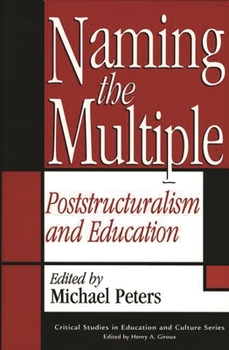Naming the Multiple: Poststructuralism and Education
Select Format
Select Condition 
Book Overview
Poststructuralism--as a name for a mode of thinking, a style of philosophizing, a kind of writing--has exercised a profound influence upon contemporary Western thought and the institution of the university. As a French and predominantly Parisian affair, poststructuralism is inseparable from the intellectual milieu of postwar France, a world dominated by Alexandre Koj ve's and Jean Hyppolite's interpretations of Hegel, Jacques Lacan's reading of Freud, Gaston Bachelard's epistemology, George Canguilhem's studies of science, and Jean-Paul Sartre's existentialism. It is also inseparable from the structuralist tradition of linguistics based upon the work of Ferdinand de Saussure and Roman Jacobson, and the structuralist interpretations of Claude L vi-Strauss, Roland Barthes, Louis Althusser, and the early Michel Foucault. Poststructuralism, considered in terms of contemporary cultural history, can be understood as belonging to the broad movement of European formalism, with explicit historical links to both Formalist and Futurist linguistics and poetics, and with aspects of the European avant-garde, especially Andr Breton's surrealism. Each essay in this unique collection by and for educators is devoted to the work and educational significance of one of ten major poststructuralist philosophers.
Format:Paperback
Language:English
ISBN:0897895495
ISBN13:9780897895491
Release Date:June 1998
Publisher:Praeger
Length:288 Pages
Weight:1.01 lbs.
Dimensions:0.8" x 6.1" x 9.2"
Customer Reviews
0 rating





